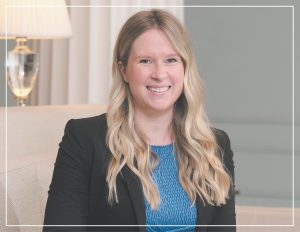Subscriber Benefit
As a subscriber you can listen to articles at work, in the car, or while you work out. Subscribe Now
Lewis Wagner LLP
Indiana University McKinney School of Law, 2014
Why did you decide to enter the legal profession?
I graduated with a major in English writing and a minor in sociology from DePauw University. As graduation approached, I panicked when faced with the inevitable (and well-intentioned) question of what came next. I wanted to help others in times of need. And I consider myself a lifelong learner. Ultimately, I decided to enter the legal profession because it seemed to encapsulate my desire to serve others, my quest to problem-solve and my academic curiosity.
If you hadn’t pursued a legal career, what would you be doing?
I would have been a teacher, and perhaps a swim coach.
Who is someone who has inspired you in your career?
My parents, John and Katy Harbison. They have provided a solid foundation grounded in hard work, love and family, that I have built my life on. I’d be remiss not to mention my work family at Lewis Wagner. My colleagues are so much more than colleagues—depending on the situation, they are mentors, confidants and advocates. I also work with my dearest friend, Barath Raman, for which I feel grateful daily. Finally, my husband, Spencer. I’m not sure where I’d be without him.
What is something you wish people knew about lawyers?
Lawyers are not a one-size-fits-all group. People are sometimes shocked to find out that I am a lawyer, especially when they find out I’m a litigator. I hope that is because I’m not the mold of the “typical” lawyer that many associate with our profession. Most lawyers are empathetic and kind people.
What’s the best advice you’ve ever received?
Is there any better advice than The Golden Rule? Treat others the way you want to be treated. I also received basic guidance from a fellow lawyer when I embarked on my legal career—to be authentic. Early on, I (mistakenly) thought that I had to emulate the stereotypical lawyer in my mind to be an effective advocate; i.e., to be aggressive, outspoken and argumentative. Once I realized I could be effective in my own way by being true to myself, I began to feel like less of an imposter and more of a legitimate lawyer.
Tell us about a “lesson learned” moment you’ve had in your career.
During many of my formative years, I worked directly with Tom Hays. I observed and absorbed the way he practices. Tom is soft-spoken and generally easygoing (as am I, which I used to view as a weakness). I’ve learned from Tom that what goes around truly does come around. Civility in an inherently combative field is of the utmost importance to serve our clients effectively and efficiently.
What makes a good lawyer/judge?
Honesty and integrity, a solid work ethic, effective communication skills and high emotional intelligence are vital. People seek out lawyers in times of crisis, and being able to connect with others and truly comprehend their concerns and desires is essential.
Please enable JavaScript to view this content.
